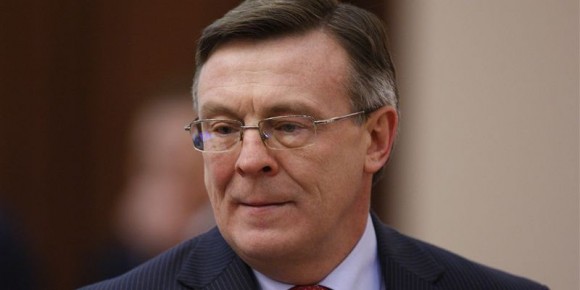OSCE chair says Minsk Group 'could be more active' (UPDATE)

By Sara Rajabova
The work of the OSCE Minsk Group -- which is brokering a settlement to the Armenia-Azerbaijan Nagorno-Karabakh conflict -- could be more active, OSCE Chairperson-in-Office, Ukrainian Foreign Minister Leonid Kozhara said at a press conference in Yerevan on July 15, Armenian media reported.
Kozhara reminded that the settlement of "frozen conflicts" is one of the priorities of Ukraine's presidency.
"Ukraine is surrounded by frozen conflicts that are in both Moldova and the South Caucasus. The attention paid by the Ukrainian side to the issue is conditioned by this," the OSCE chief said.
According to him, Ukraine is guided by the necessity to maintain an active process and conduct meetings in different formats -- at the level of the presidents and foreign ministers.
Kozhara said Ukraine supports the efforts of the OSCE Minsk Group, but believes that the Minsk Group could be more active and its work could have a more specific result.
"Not a single conflict has been resolved after a conference or a meeting. Practical work is needed," Kozhara said.
He also stressed the importance of organizing meetings between representatives of civil society.
According to Kozhara, Ukraine is ready to host such a meeting.
In addition, he said, Kiev supports all activities aimed at alleviating the consequences of humanitarian disasters, which is a consequence of any conflict.
During his visit to Azerbaijan, Kozhara said after a meeting with Foreign Minister Elmar Mammadyarov on July 8 that Ukraine is interested in the intensification of the Minsk Group's activity, which has recently somewhat subsided.
According to Kozhara, Kiev will support meetings of the Azerbaijani and Armenian communities and humanitarian contacts in every way, as such meetings can facilitate a solution of the Nagorno-Karabakh conflict.
However, while peace talks continue over the settlement of the Nagorno-Karabakh conflict, the situation on the frontline remains tense.
The fragility of the ceasefire on the Line of Contact between the Azerbaijani and Armenian troops remains a serious concern, OSCE Chairperson-in-Office Personal Representative Andrzej Kasprzyk told Trend news agency on July 15.
Kasprzyk pointed out that ceasefire violations will always jeopardize progress in the peace negotiations.
"Despite numerous reports of ceasefire violations this year and at least one report of an attempted incursion on the LOC, the situation on the Armenian-Azerbaijani border and the LOC remains relatively stable," Kasprzyk said.
According to the OSCE chairman's representative, the number of those reported killed or wounded is lower than in previous years.
The Nagorno-Karabakh conflict emerged in 1988 when Armenia made territorial claims against the neighboring country. Since a lengthy war between the two South Caucasus countries that displaced over a million Azerbaijanis and ended with the signing of a precarious cease-fire in 1994, Armenian armed forces have occupied over 20 percent of Azerbaijan's internationally recognized territory, including the Nagorno-Karabakh region and seven surrounding districts.
Peace talks brokered by Minsk Group co-chairs representing the United States, Russia and France have been largely fruitless so far.
Peace talks are underway on the basis of the peace outline dubbed the Madrid Principles, also known as Basic Principles. The document envisions a return of the territories surrounding Nagorno-Karabakh to Azerbaijani control; determining the final legal status of Nagorno-Karabakh; a corridor linking Armenia to the region; and the right of all internally displaced persons to return home.
Here we are to serve you with news right now. It does not cost much, but worth your attention.
Choose to support open, independent, quality journalism and subscribe on a monthly basis.
By subscribing to our online newspaper, you can have full digital access to all news, analysis, and much more.
You can also follow AzerNEWS on Twitter @AzerNewsAz or Facebook @AzerNewsNewspaper
Thank you!
